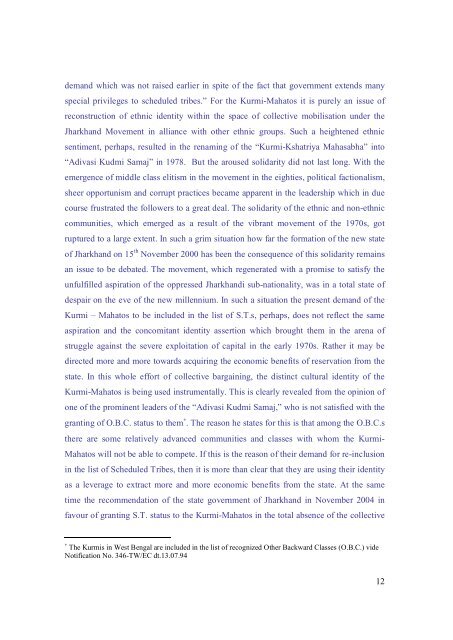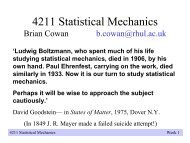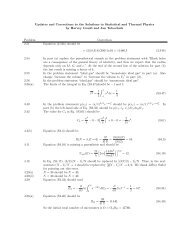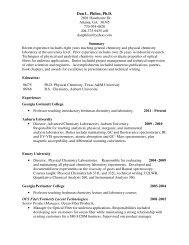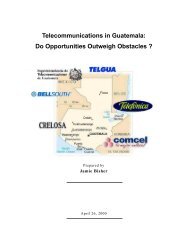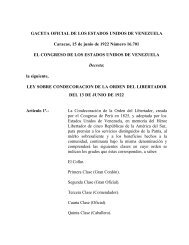Ethnicisation or Re-ethnicisation? Case of the Kurmi-Mahatos in ...
Ethnicisation or Re-ethnicisation? Case of the Kurmi-Mahatos in ...
Ethnicisation or Re-ethnicisation? Case of the Kurmi-Mahatos in ...
You also want an ePaper? Increase the reach of your titles
YUMPU automatically turns print PDFs into web optimized ePapers that Google loves.
demand which was not raised earlier <strong>in</strong> spite <strong>of</strong> <strong>the</strong> fact that government extends many<br />
special privileges to scheduled tribes.” F<strong>or</strong> <strong>the</strong> <strong>Kurmi</strong>-<strong>Mahatos</strong> it is purely an issue <strong>of</strong><br />
reconstruction <strong>of</strong> ethnic identity with<strong>in</strong> <strong>the</strong> space <strong>of</strong> collective mobilisation under <strong>the</strong><br />
Jharkhand Movement <strong>in</strong> alliance with o<strong>the</strong>r ethnic groups. Such a heightened ethnic<br />
sentiment, perhaps, resulted <strong>in</strong> <strong>the</strong> renam<strong>in</strong>g <strong>of</strong> <strong>the</strong> “<strong>Kurmi</strong>-Kshatriya Mahasabha” <strong>in</strong>to<br />
“Adivasi Kudmi Samaj” <strong>in</strong> 1978. But <strong>the</strong> aroused solidarity did not last long. With <strong>the</strong><br />
emergence <strong>of</strong> middle class elitism <strong>in</strong> <strong>the</strong> movement <strong>in</strong> <strong>the</strong> eighties, political factionalism,<br />
sheer opp<strong>or</strong>tunism and c<strong>or</strong>rupt practices became apparent <strong>in</strong> <strong>the</strong> leadership which <strong>in</strong> due<br />
course frustrated <strong>the</strong> followers to a great deal. The solidarity <strong>of</strong> <strong>the</strong> ethnic and non-ethnic<br />
communities, which emerged as a result <strong>of</strong> <strong>the</strong> vibrant movement <strong>of</strong> <strong>the</strong> 1970s, got<br />
ruptured to a large extent. In such a grim situation how far <strong>the</strong> f<strong>or</strong>mation <strong>of</strong> <strong>the</strong> new state<br />
<strong>of</strong> Jharkhand on 15 th November 2000 has been <strong>the</strong> consequence <strong>of</strong> this solidarity rema<strong>in</strong>s<br />
an issue to be debated. The movement, which regenerated with a promise to satisfy <strong>the</strong><br />
unfulfilled aspiration <strong>of</strong> <strong>the</strong> oppressed Jharkhandi sub-nationality, was <strong>in</strong> a total state <strong>of</strong><br />
despair on <strong>the</strong> eve <strong>of</strong> <strong>the</strong> new millennium. In such a situation <strong>the</strong> present demand <strong>of</strong> <strong>the</strong><br />
<strong>Kurmi</strong> – <strong>Mahatos</strong> to be <strong>in</strong>cluded <strong>in</strong> <strong>the</strong> list <strong>of</strong> S.T.s, perhaps, does not reflect <strong>the</strong> same<br />
aspiration and <strong>the</strong> concomitant identity assertion which brought <strong>the</strong>m <strong>in</strong> <strong>the</strong> arena <strong>of</strong><br />
struggle aga<strong>in</strong>st <strong>the</strong> severe exploitation <strong>of</strong> capital <strong>in</strong> <strong>the</strong> early 1970s. Ra<strong>the</strong>r it may be<br />
directed m<strong>or</strong>e and m<strong>or</strong>e towards acquir<strong>in</strong>g <strong>the</strong> economic benefits <strong>of</strong> reservation from <strong>the</strong><br />
state. In this whole eff<strong>or</strong>t <strong>of</strong> collective barga<strong>in</strong><strong>in</strong>g, <strong>the</strong> dist<strong>in</strong>ct cultural identity <strong>of</strong> <strong>the</strong><br />
<strong>Kurmi</strong>-<strong>Mahatos</strong> is be<strong>in</strong>g used <strong>in</strong>strumentally. This is clearly revealed from <strong>the</strong> op<strong>in</strong>ion <strong>of</strong><br />
one <strong>of</strong> <strong>the</strong> prom<strong>in</strong>ent leaders <strong>of</strong> <strong>the</strong> “Adivasi Kudmi Samaj,” who is not satisfied with <strong>the</strong><br />
grant<strong>in</strong>g <strong>of</strong> O.B.C. status to <strong>the</strong>m ∗ . The reason he states f<strong>or</strong> this is that among <strong>the</strong> O.B.C.s<br />
<strong>the</strong>re are some relatively advanced communities and classes with whom <strong>the</strong> <strong>Kurmi</strong>-<br />
<strong>Mahatos</strong> will not be able to compete. If this is <strong>the</strong> reason <strong>of</strong> <strong>the</strong>ir demand f<strong>or</strong> re-<strong>in</strong>clusion<br />
<strong>in</strong> <strong>the</strong> list <strong>of</strong> Scheduled Tribes, <strong>the</strong>n it is m<strong>or</strong>e than clear that <strong>the</strong>y are us<strong>in</strong>g <strong>the</strong>ir identity<br />
as a leverage to extract m<strong>or</strong>e and m<strong>or</strong>e economic benefits from <strong>the</strong> state. At <strong>the</strong> same<br />
time <strong>the</strong> recommendation <strong>of</strong> <strong>the</strong> state government <strong>of</strong> Jharkhand <strong>in</strong> November 2004 <strong>in</strong><br />
favour <strong>of</strong> grant<strong>in</strong>g S.T. status to <strong>the</strong> <strong>Kurmi</strong>-<strong>Mahatos</strong> <strong>in</strong> <strong>the</strong> total absence <strong>of</strong> <strong>the</strong> collective<br />
∗ The <strong>Kurmi</strong>s <strong>in</strong> West Bengal are <strong>in</strong>cluded <strong>in</strong> <strong>the</strong> list <strong>of</strong> recognized O<strong>the</strong>r Backward Classes (O.B.C.) vide<br />
Notification No. 346-TW/EC dt.13.07.94<br />
12


